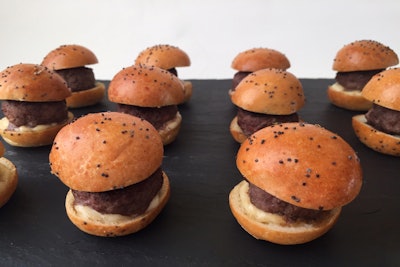It turns out that saving the planet can also improve the bottom line.
With food waste at the forefront of his mind, executive creative chef Mark Russell noticed a rather full compost bin one day while in the Great Performances (GP) kitchen. As he sifted through the discarded scraps, he discovered parsley and broccoli stems, cauliflower cores, and even slivers of salmon belly.
Russell’s role includes designing menus with high-quality ingredients, and so he recognized the value of what lay in the trash. Inspired by a conversation with C.E.O. Liz Neumark, Russell realized that something greater could be done to reclaim the compost vegetable, fruit, meat, and fish scraps.
After extensive research and much experimentation, the seasonal menu was expanded to include a new offering of “traditional” hors d’oeuvres in homage to the time-honored culinary tradition of conserving waste. Think Root-to-Frond or Nose-to-Tail, as these new items attempt to utilize the entire plant and animal.
Recipe origins for these items are in fact not new, but rather historic. While creating GP’s traditional hors d’oeuvres, Russell recalled the habits of his grandmother and mother. During the depression of the 1920s, both sets of Russell’s grandparents maintained vegetable gardens, kept chickens, and traded with neighbors for variety.
It was during his childhood, in the late ’60s and ’70s, when the economy seemed to dip that Russell’s mother would carefully consider what the family would eat for dinner, what would be packed in lunch bags, and whether there would be an afternoon snack for his brother, sister, and himself. Most importantly, Russell’s mother critically assessed what would end up in the trash and determined that little would.
Thoughtfulness was at the center of her kitchen where nothing went to waste. Leftover potatoes were fried up with eggs in the morning. Sunday roasts became sandwiches throughout the week. Day-old bread transformed into French toast. Soups, stews, casseroles… a myriad of culinary strategies made food waste an unwelcomed guest in the kitchen.
Many people have similar memories of the way their grandmothers and mothers cooked with equal parts love and thriftiness. A deep respect for the ingredients inspires chefs and home cooks to cook creatively and with passion that also results in less waste. This traditional notion not only derives from recalling ancestral behavior but also from modern-day global practices. Many members of the company’s culinary team hail from all over the world, with thoughtful thriftiness embedded in their food cultures. In fact, some of the world’s greatest cuisines elevate leftovers to legendary dishes.
Mother Nature allocates many resources to grow and nourish plants and animals. It is important to understand that throwing away a 5-ounce broccoli stem is not simply wasting the $2.49 per pound of cost, but also, the 5.4 gallons of water it took to grow that one broccoli head. Not to mention the labor inputs to seed, grow, harvest, process, and deliver the food nor the 30.7 gallons of diesel fuel it took to drive 200 miles.
The traditional hors d’oeuvre line is GP’s approach to fully respecting ingredients with added benefits of reduced food cost, increased creativity, and a greater connection to what is on its plates.
Great Performances’ mission is Collaborative Commitment to Service, Innovation, and Quality.
GP integrates these principles into all aspects of work, from delicious food and striking design to attentive service to an understanding of trends and value. Founded in 1979 as a waitress service for women in the arts, Great Performances has the privilege to work with clients at some of the city’s most prestigious cultural institutions, including Jazz at Lincoln Center, Brooklyn Museum, BAM, and the Apollo Theater. It is GP’s duty to remain a thought leader and to integrate a holistic approach to food such as the traditional hors d’oeuvre line.






















